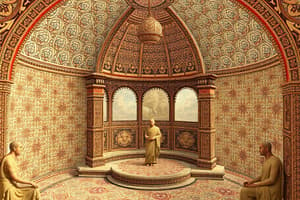Podcast
Questions and Answers
Indian mathematics emerged in the Indian subcontinent from 1200 BCE until the end of the 18th century.
Indian mathematics emerged in the Indian subcontinent from 1200 BCE until the end of the 18th century.
True (A)
The decimal number system was first recorded in Indian mathematics.
The decimal number system was first recorded in Indian mathematics.
True (A)
Indian mathematicians did not make any contributions to the study of the concept of zero as a number.
Indian mathematicians did not make any contributions to the study of the concept of zero as a number.
False (B)
Trigonometry was further advanced in India, and the modern definitions of sine and cosine were developed there.
Trigonometry was further advanced in India, and the modern definitions of sine and cosine were developed there.
Ancient and medieval Indian mathematical works were not composed in Sanskrit.
Ancient and medieval Indian mathematical works were not composed in Sanskrit.
Flashcards are hidden until you start studying
Study Notes
Indian Mathematics
- Emerged in the Indian subcontinent from 1200 BCE to the end of the 18th century
- Decimal number system was first recorded in Indian mathematics
- Made significant contributions to trigonometry, including the development of modern definitions of sine and cosine
Notable Facts
- Indian mathematicians did not contribute to the study of the concept of zero as a number
- Ancient and medieval Indian mathematical works were not written in Sanskrit
Studying That Suits You
Use AI to generate personalized quizzes and flashcards to suit your learning preferences.




